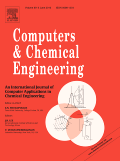 Authors: P. A. ROLANDI, J. A. ROMAGNOLI
Authors: P. A. ROLANDI, J. A. ROMAGNOLI
Affiliations: Process Systems Enterprise Ltd., 107a Hammersmith Bridge Road, London W6 9DA, United Kingdom and Department of Chemical Engineering, Louisiana State University, Baton Rouge, LA 70803, USA
Reference: P.A. Rolandi, J.A. Romagnoli, Integrated model-centric framework for support of manufacturing operations. Part I: The framework, In Computers & Chemical Engineering, Volume 34, Issue 1, 2010, Pages 17-35
Abstract: “Model-centric technologies must overcome a number of challenges limiting their ability to meet the needs of the Process Industries. First, a software component enabling the formulation of hybrid data-driven/model-based problems must be developed so that a number of realistic computer-aided process-engineering (CAPE) activities can be performed in an industrial environment. Second, these software components must be integrated into a single software platform so that the synergy between complementary model-based applications is unlocked and fully exploited by end-users….”
DOI: 10.1016/j.compchemeng.2009.08.006
Comments: in section 3.2, the authors summarize the aspects of the CAPE-OPEN standards that pertain to numerics and especially mention the Equation Set Object. They state that “the so-called Equation Set Object (ESO) has been accepted by the CAPE community as an appropriate software abstraction of a generic set of differential-algebraic equations (DAEs).” Acceptance however does not mean numerous implementations and sustained usage. The authors are taking CAPE-OPEN as “an enabling paradigm to support the creation of the advanced framework proposed later in this paper and as a point of reference to inspire some of its most innovative features.” Later on the authors describe the additional functionality introduced on ESOs in gPROMS which remains most surely the piece of software which has been making the most use of the CAPE-OPEN Numerical interfaces internally. As such this paper is recommended for reading in order to give insight on the modifications introduced to the ESO concept in gPROMS.
